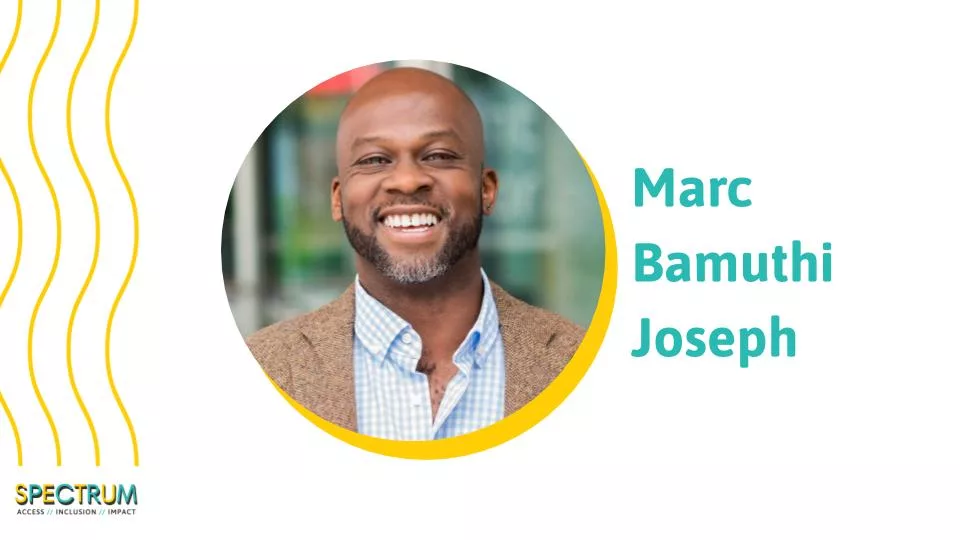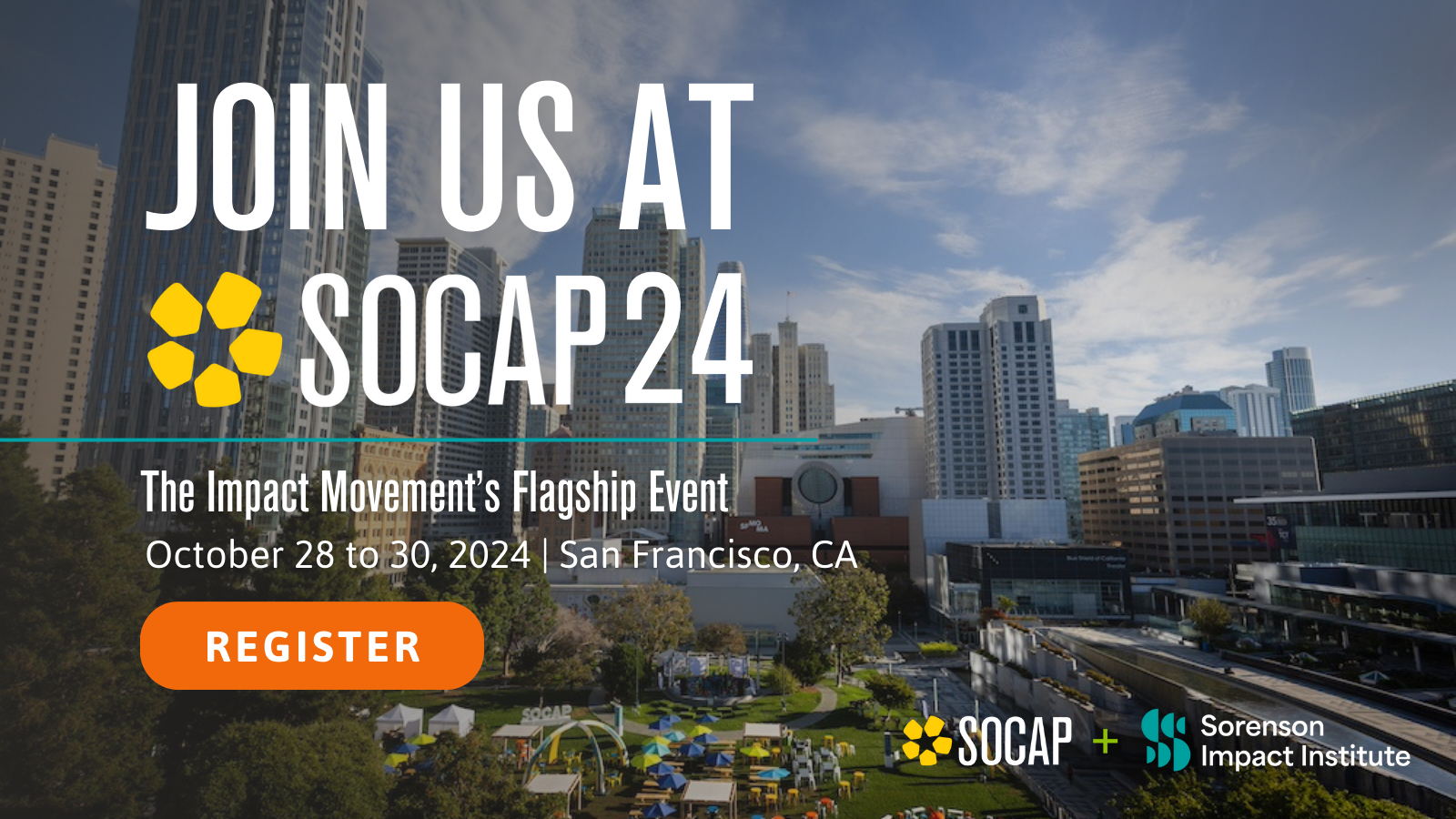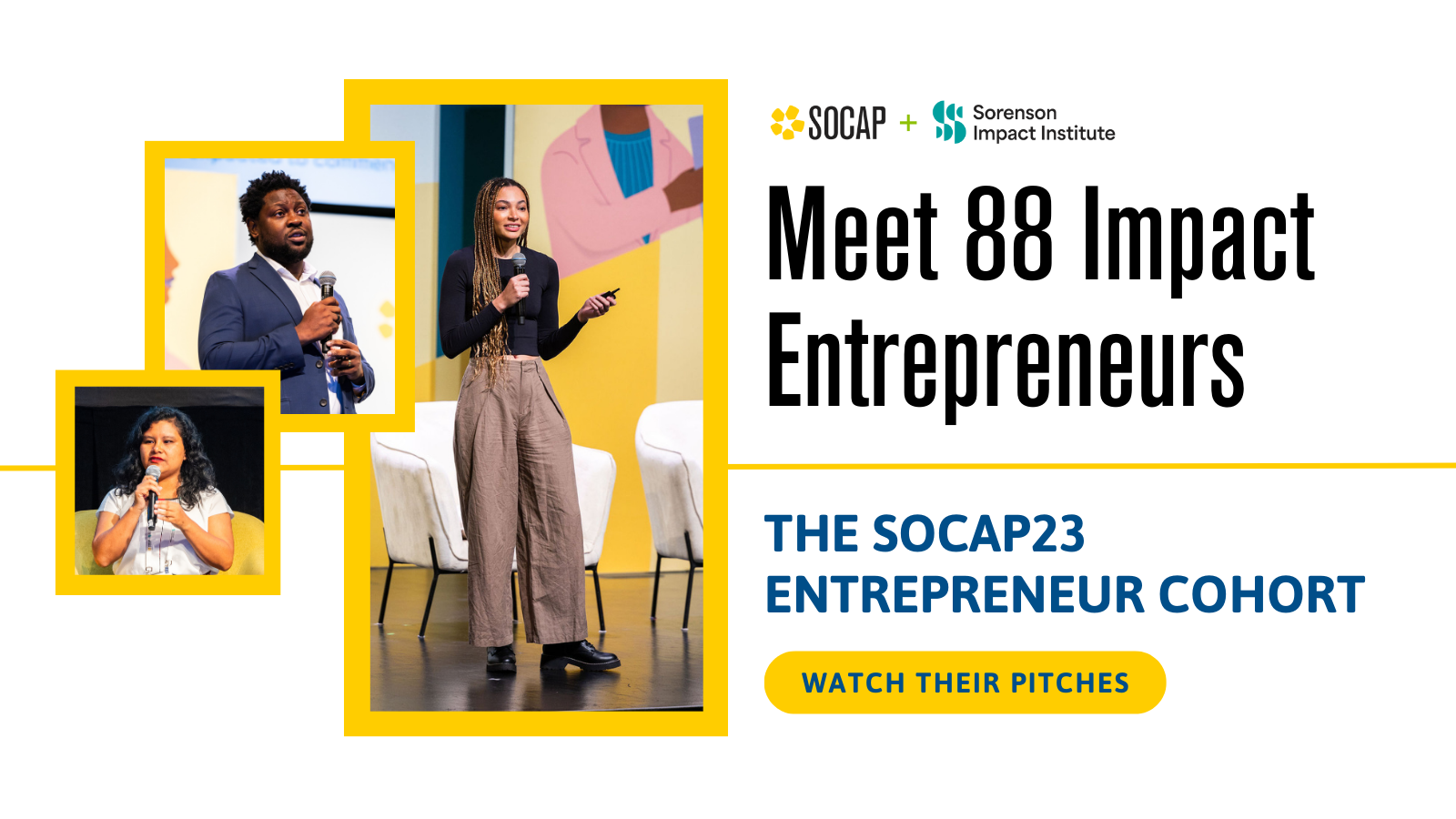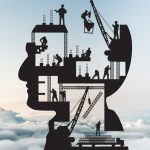Marc Bamuthi Joseph closed out SPECTRUM 2020 on the last day with a powerful performance about the systematic racism plaguing the country. Watch and listen to his performance or read the full transcript below.
Marc Bamuthi Joseph: “In the shadow of morning, a man runs for pleasure. In three weeks time, a virus will shut down his country, but he doesn’t know that yet. He’s making his heart work, breaking a sweat because the young man is alive. He’s 25. He was born on a Sunday. He’s wearing all white, because it’s fly. He’s not going to a ceremony or whatever. His gear is bright as fuck. He has nothing to hide, running for his health.
His country is sick, symptomatic systemic violence, sadistic bigots and a complicit network of badges and judges and a stunning lack of originality, which really fellows in Georgia, pickup trucks and rifles and lynching, the crude instruments, soothing the cancerous hands, bloody racist trigger fingers, itching. A man running for pleasure. American illness killed him. While someone was filming, three district attorneys reviewed the case. Two whole months went by and the whole world watched the tape before anybody thought to put his killers in prison.
You’re going to talk about a virus. You’re going to talk about contagion. You want to talk about something that make you want to stay inside because you just might catch it when you step out your own front door on an arbitrary Tuesday and you alone, finding yourself fighting for your life, hear something explode like a raisin in the sun, heart beating at the pace to meet the blood needs of your run. And suddenly you realize that you can’t breathe. The disease was inevitable, but the fallout is preventable. We cannot eliminate racism, but could we, America, cure ourselves of racial injustice. Justice for Ahmaud Arbery.
I wrote that poem in a moment of anger and despair. The night before, Mr. Arbery’s murderers were charged and jailed. Two weeks later, as I write these notes, George Floyd is dead, killed while an officer of the law literally knelt down on his neck. In between, I had an illuminating conversation with a mental health professional about the nature of race-based hate, which I initially characterized as pathology.
Pathology, as in, there’s got to be some kind of test a person can take before they’re admitted to the police force, that measures a dangerous level of racism. That officer, those men in Georgia, they’re psychopaths. They’re sociopath’s. She patiently clinically corrected me. She says at a minimum, racism is not a psychological disorder because it can be taught. You cannot teach a psychopathy. So if the racist can be a healthy individual, it stands to reason that the society and the social codes they’re in are the underlying issue.
Racism is a symptom of a sick society. A psychologist diagnoses an individual. The individual does the work to self-stabilize or heal. Similarly, an artist diagnoses society. An artist gives society the tools it needs to see itself; all the good, all the possibility, and also all the disease from which it might heal. In a short period of time, we’re going to go from thinking about public health from a virological standpoint to thinking about health from an emotional standpoint. Health from a post-traumatic standpoint. What I want to do right now is spend a little time advocating for the deployment of artists as leaders, as we collectively heal from the trauma of the pandemic. I want to challenge the future functionality of the cultural sector itself. I want to suggest that without inspired, cohesive political leadership, it’s going to fall on cultural leaders to design and model our post-COVID healing apparatus. I want to talk about how we relearn to feel alive in public.
For the last decade or so, I’ve made a lot of arts-centered work, where I used the words cross-sector or interdisciplinary. Cross-sector fellowship programs at Yerba Buena Center for the Arts in San Francisco, interdisciplinary social practice projects through the Guggenheim Museum, interdisciplinary performance from Carnegie Hall to BAM (Brooklyn Academy of Music), cross-sector culture caucuses at the Kennedy Center. The terms are accurate and useful, but the frame that makes them useful is the context of the fairly transactional spaces that funded the work itself.
My work bears the mark of class distance and privilege. There’s a healthy share of our arts economy that’s teetering on that very specific tension, the public good over here and private or philanthropic wealth over here. But 2020 has collided those two things together in this theater of the absurd called the public health. For the artists and for arts institutions, we’ve been using this frame of cross sector, but that implies economic categories or vectors. Our current call is to think about the frame of the integrated healing instead.
Now, I’ve lived in California my whole adult life, so the idea of a therapeutic cocktail that involves Chinese herbs, acupuncture, exercise, poetry readings, Advil, and a puppy, it just sounds right to me. For an individual body, integrated healing is an intentional approach. It involves a reciprocal relationship between patient and practitioner. It definitely combines a wide array of therapies aimed at improving one’s total health. So now, extrapolate that to social ill.
Our post-COVID body politic still runs the course of a pre-COVID racial timeline, a pre-COVID climate response, a pre-COVID heteronormative patriarchy. This particular epidemiological sickness is chaotic, it’s catastrophic, and it’s an opportunity to address the total health of the body politic with art and culture centered as medicine. The Chamber of Commerce is thinking about the economic crisis. The humanitarians, our allies, we have to think about the impending mental health crisis, the psychology of reentry.
Here is where I wish we weren’t experiencing such a crisis of leadership. It would be awesome for somebody to call out COVID-19 as an integrated opportunity, rather than a political problem, someone to inspire a Manhattan Project, but centered on amelioration or a moonshot with culture as the launching pad, someone operating from a moral center and at the edge of culture, but shit is too real for me to wait for that particular cure. I can’t act like politics is inherently a force of nature when we’re facing actual natural disasters in real time.
I’m in the demo of arts workers impacted by COVID-19. I’ve lost revenue, I’ve been furloughed, I’ve canceled premiers. This is the season of loss and adaptation. My entire livelihood is built on bringing people together. And I am personally struggling with a fear that it will be years, not months, before I feel comfortable around people again. I am personally implicated in the stakes of what we in the culture sector do next. Before any of those identity markers, I am human. I crave connection — safe, compassionate, and expansive human connection. As the country’s traffic lights switched from red to yellow, arts institutions should be in the crossroads of American culture, directing us how to walk toward healthy, embodied connection. Artists should lead us in the literacy of post-COVID social interaction.
Rather than shows, I advocate for arts institutions to intentionally produce cultural health, funding creatives, mental health professionals, urban planners, economists, and sociologists to intentionally design the landscape of our social reintegration. Arts institutions can skillfully, safely, humanely and imaginatively be the civic glue for how our country relearns to feel alive in public space.
Real time example: I’m completing an opera libretto in March of 2020 when the performing arts field starts to shut down. Through a mixture of savings and hustle, unemployment, and God’s grace, I get myself to the end of the year. I complete the libretto by the end of 2020, only to find out that the producing theater isn’t sure how to manage the social or financial economics of presenting a work of scale in 2021. So what if instead of work for the theater, we spent the next year commissioning artists to help institutionally design how theater is going to work? Like if a theater commissioned me to design and implement a system, to lead a collaborative team of staff and stakeholders, to rethink our physical architecture and design creative experiences within them for our post-COVID times, rethink theaters as sites of creative wellness.
Here’s what it boils down to: Large corporations have thus far pledged hundreds of millions of dollars over the last week in the name of curing social ills, curing social ills. These are big investments with vague pronouncements. And they’re vague because the specifics of anti-racism work leads to the uncomfortable truth that racism is the foundational infrastructure of American capitalism. The extractive economy is predicated on a narrative of social hierarchy. But 2020 has given us the opportunity to invest in social equity. To that end, it gives us the chance to invest in the artful management of public spaces, to invest in artists as a means of cultivating a healthier and more culturally interdependent society.
Our financial resuscitation should be tied to methodologies and relationships to the social contract. In order to do this, man, we must deploy artists in our country not just to make art, but to intentionally make a healthy culture. We have to use art centers, not just to show art, but to make community. The currency of arts organizations and the work of artists aren’t some extra side hustle thing that America is doing. Right now, art is a lot of what is America itself. That value should carry over into how we build the economy for whatever it is that’s coming next for us all. We can build the structural economy and the moral economy at the same time by integrating artists more soundly into our system’s thinking. Boldly invite philanthropists and patrons and government to follow suit.
When I hear news of a hitchhiker struck by lightning, yet living, or a child lifting a two ton sedan to free his father pinned underneath, or a camper fighting off a grizzly with her bare hands until someone, a hunter perhaps, can shoot it dead, my thoughts turned to Black people. “The hysterical strength we must possess to survive our very existence, which I fear, many believe is and treat as itself, a freak occurrence.” Those are the words of the incredible poet, Nicole Sealey.
I began this talk talking about the difference between psychopathy and social ill, between a sick person and a sick society. And maybe now I’ll close, not by talking about difference, but the symmetry between acts of courage and acts of survival. I speak from the vantage point of the privileged and the hunted. When I think of most of the organizers I really love and have learned from — Brett Cook, Chinaka Hodge, Hodari Davis, Tango Iza Martin, Theaster Gates, Rick Lowe, Karon Davis — they’re artists that are making oasis for cultural health in soulful ways. Theirs are acts of intellect, of community, and also the intense feeling that both their ancestors and the slave catchers is on they ass, and they are. Flight and fight.
I ask of arts institutions and the people who support them, if not a pandemic, what act of nature would give us the hysterical strength we need to lift the country up to act as some of us must? Act with the courage it takes to survive with our collective health intact. Thank you.”
Marc Bamuthi Joseph Bio:
BAMUTHI (Marc Bamuthi Joseph) is a 2017 TED Global Fellow, an inaugural recipient of the Guggenheim Social Practice initiative, and an honoree of the United States Artists Rockefeller Fellowship. Joseph’s opera libretto, We Shall Not Be Moved, was named one of 2017’s “Best Classical Music Performances” by The New York Times. His evening-length work created in collaboration with composer Daniel Bernard Roumain, “The Just and The Blind,” was commissioned by Carnegie Hall and premiered to a sold-out house at Carnegie in March 2019. His upcoming piece, “In His Name” is inspired by the forgiveness exhibited by the congregation of Emanuel AME church in Charleston, and will premiere at The Perelman Center in New York in 2021.
While engaging in a deeply fulfilling and successful artistic career, Bamuthi also proudly serves as Vice President and Artistic Director of Social Impact at the John F. Kennedy Center for the Performing Arts in Washington, DC. He is in high demand for his creative approach to organizational design, brand development, and community mediation, and has been enlisted as a strategic partner or consultant for companies ranging from Coca Cola to Carnegie Hall. His TED talk on linking sport to freedom design among immigrant youth has been viewed nearly 1 million times, and is a testament to his capacity to distill complex systems into accessible and poetic presentations. Bamuthi’s community development philosophy, called “The Creative Ecosystem”, has been implemented in dozens of cities across the United States and is the subject of several critical writings, including one of the seminal essays in “Cultural Transformations: Youth and Pedagogies of Possibility”, published by Harvard Education Press.
Bamuthi is the founding Program Director of the exemplary non-profit Youth Speaks, and is a co-founder of Life is Living, a national series of one-day festivals which activate under-resourced parks and affirm peaceful urban life. His essays have been published in Harvard Education Press; he has lectured at more than 200 colleges, has carried adjunct professorships at Stanford and Lehigh, among others.







